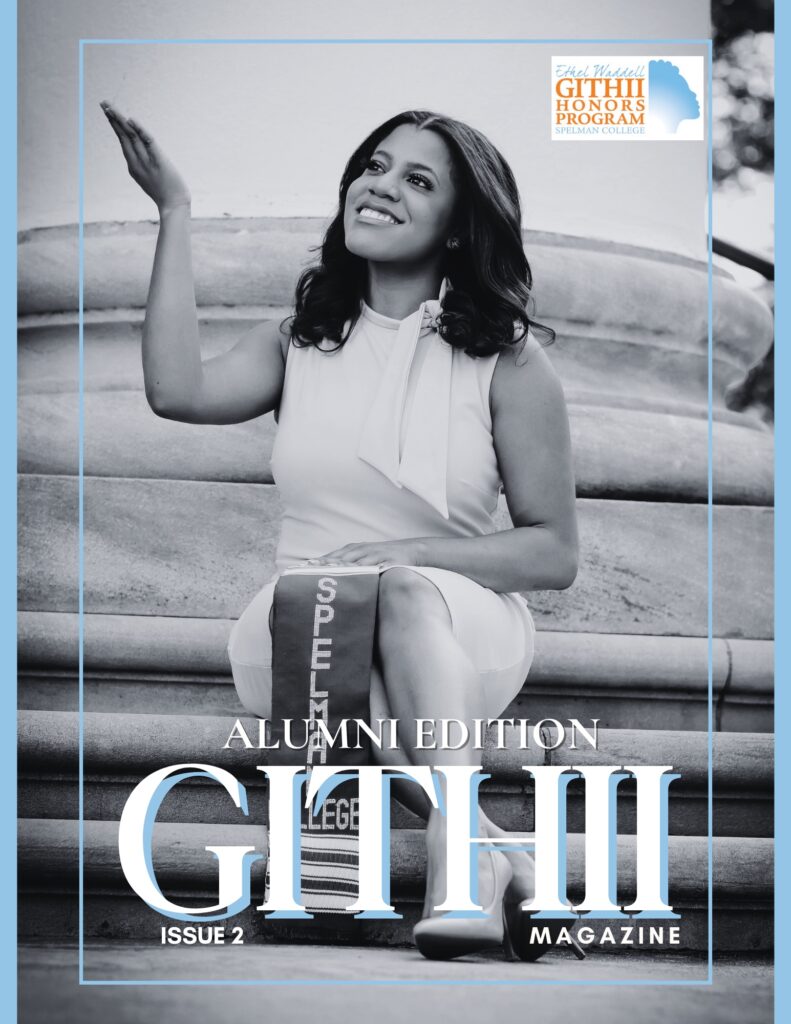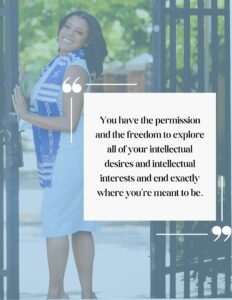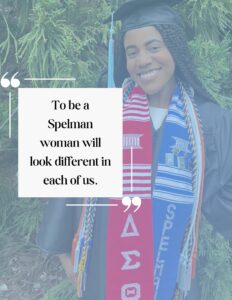As students begin visualizing their future, it is also essential to realize that our paths are not limited or restricted to a single step-by-step guide they must follow to reach their career or academic goals. We can take a liberated path to explore multiple interests, careers, and goals. Today, HPSA explores this topic with Chandler Nutall, ℅ 2023.
Chandler was an English Major with an interest in philanthropy and social justice who graduated Summa Cum Laude. While at Spelman, she served multiple years on the Student Government Association, serving as SGA President her senior year, was involved with the Social Justice Program, and is a Spring 22 initiate of Delta Sigma Theta Sorority Inc. She received various honors, including Phi Beta Kappa, Alpha Lambda Delta, National Society of Collegiate Scholars, and graduated as one of four Co-Valedictorian.
In this interview, Chandler expounds on finding the courage and freedom to think creatively about the path she would like to take, how her interaction within the Spelman community led to earning notable achievements, and pushing through comfort and acting with intentionality to learn and grow.
First, we have to start with your Spelman intro and your career goals and interests after Spelman.
My name is Chandler Nutall, I am from Washington, D.C.. I have recently graduated from Spelman with the class of 2023, as an English major. My professional goals have never been linear. It’s always been a matter of consolidating all of the diverse and varied interests that I have and trying to see what career will make me happy to go to work everyday and allows me to combine my passions and personal interests and what I’m naturally good at.
I have very much jumped around in terms of being interested in education policy for the majority of my Spelman experience then finally landing on philanthropy. Ultimately, I think that overseeing philanthropic portfolios, their grant application processes, and the distribution of funding would allow me to support organizations that uplift marginalized communities. If I were to go into the philanthropic sector in that capacity, I would come into that with a focus on the type of community and work I want to support. I could use the money from the foundation or organization I work for to support and promote the organizations that are doing amazing work to support marginalized communities.
Are there any particular organizations you have your eye on right now?
The Obama foundation is doing amazing work in the Chicago area and is definitely on my radar. What I have been able to identify and learn while surveying [the philanthropic sector] is that actually with every major company, there is more than likely a philanthropic component to it. A lot of companies and corporations are interested in being able to promote themselves as being service-oriented in some capacity and giving back to the community. So there is a lot of variety that exists in the philanthropic sector.
Right now, I work for the National Basketball Players Association and they have a philanthropic arm as well. There are places that one may not traditionally think have a foundation or a philanthropic component that actually do. So that is why I am trying to leave myself open to different kinds of work in the field.
You recently learned you were possibly the first person to serve as SGA president and receive the honor of Valedictorian from the Spelman historians, is that right? To, not only, be a voice for your class, but also to be such an academic leader, how did it feel learning about that achievement?
Yes, I didn’t find out from the historians themselves. I actually found out from the Dean of Undergraduate Studies who reached out to the archivist.
Well, let me first say my aspirations to be SGA president and towards scholarship that led me to being Co-Valedictorian, I never pursued either one with the desire of being the first in something or with the desire to receive some major acclaim. At the end of the day, I’m just competing against myself. It’s always me against me and it’s a matter of how I can reach and go above and beyond this gold standard I have for myself.
In terms of how I thought about it, to be able to actually have such an honor is really really heartwarming, again, because I don’t really go out there trying to be number one, I just go as hard as I can and see where it takes me. So to be able to have that be the outcome of all the hard work that I came into Spelman desiring to do, it’s heartwarming to be recognized this way. Even more than that, I can’t reflect on all the hard work I put in SGA or maintaining my grades without reflecting on all the people who helped me get there.
I, in no way, became SGA president by myself. I had an amazing team behind me and when it came to my academic studies, I also had an amazing group of peers and professors and administrators who were cheering me on. It’s definitely a group effort and a massive honor to achieve.
How was it balancing your academics, your extracurriculars, and your social life with how active you were within the Spelman community?
The biggest thing is setting boundaries because I learned very quickly, especially as I got older and began matriculating through Spelman, that if you don’t set parameters around your time, people are going to keep asking for your time and they’re going to keep taking your time. Being able to understand that this is what I have the capacity to do and this is what I don’t have the capacity to do; this is as much as I can do at this time and maybe later, I can come back and give more but for right now, this is the best I can do.
So, being able to be honest with myself, then having the courage to say no and stand up for myself because it can be hard to say no. It can feel weird to say no because you want to be able to show up as much as you can, you want to be able to provide yourself to support those around you, but sometimes you just don’t have the capacity to do that and that takes a level of self awareness to set that boundary and recognize that sometimes you have to stop and say no. Setting boundaries has been the biggest help for me.
You also were a Social Justice Fellow during your time at Spelman, so how has the Social Justice Fellowship and the Honors Program prepared you for your career goals?
The Honors Program and the Social Justice Program contributed to my Spelman experience in very different ways. The Honors Program, specifically Dr. Hite, very much forced me to think more creatively and broadly about who I am as a thinker and as a professional and how I want to apply myself because coming into Spelman, I had a very narrow perspective. For example, if I do A plus B that’ll take me to C, well that’s not always true. You can do A, B, go down to Z, do a little bit of Q, then go back to G. I think Dr. Hite, especially, made me understand there is no linear way of getting anywhere. You have the permission and the freedom to explore all of these intellectual desires that you have and all of your intellectual interests and end exactly where you’re meant to be. I absolutely without a doubt owe that to Dr. Hite.
On the other hand, considering one of my major and special interests is social justice advocacy, I think the Social Justice Program exposed me to different avenues of pursuing that. Of course, you can lead a movement or lead a grassroot organization, but there are also many ways you can do it within a corporation or other non-profits. There are a lot of different types of work that are helpful to promoting and advancing social justice causes. So the social justice program gave me the freedom to kind of experience what it means to be a part of social justice advocacy.
Are there any programs, inside or outside of Spelman, or mentors that you feel were significant for your academic career?
Well, I would definitely say Dean Baxter. She has been absolutely instrumental in my Spelman career. She was one of the first administrators that I spoke to and gave me clarity with how I wanted to go through Spelman. Ultimately I had to figure out my Spelman journey on my own, but she gave me a lot of perspective on how to be wise and invest this time.
I also would be remiss if I didn’t mention Ms. Ingrid Hayes, the VP of Enrollment Management. She, too, gave me a lot of perspective and insight in regards to how I want to go through Spelman and what it means to be a Spelman student, in the sense that there is no meaning or definition to a Spelman student. There is so much freedom and so many options available to Spelman students and I feel like we often are forced to believe that if I’m a Spelman student, I have to do this and have to do that and that is not true. People like Dean Baxter and Ms. Hayes and Dr. Hite, gave me the perspective to understand that my journey is my own and at the end of the day, I have the freedom to pursue whatever I want to pursue, however crazy or strange it may be. If it is interesting to me, then I can do it.
For example, every single internship I have had while at Spelman has been different. There is a connecting thread, but they have been very different, intentionally so. I know that I don’t have just one career I want to do. That’s never been me. I know I have diverse interests and am multifaceted in terms of what I’m good at and in terms of what I believe in and what I want to pursue. So every single internship I’ve had at Spelman has been very different on purpose to give myself exposure to different types of careers; to expose myself to different types of skill sets and knowledge that exist, and I think I got the courage to do that because of people like Dr. Hite and Dean Baxter and Ms. Hayes.
Also people like Dean DeKimberlen Neely and Mx. Stacy Washington who all work in the office of undergraduate studies. People who encourage you to think outside of the box. We are often put into a box because there is this standard of being a Spelman woman that comes with a lot of weight and also being Black women trying to enter fields that aren’t occupied by people who look like us. There is a lot of pressure to follow a certain order or follow a certain set of steps to get somewhere, but that’s not how the world works and I’ve been given the encouragement to think a little more creatively.
You’ve already given a lot of advice within your other answers, but is there any advice you would like to give to your Spelman sisters?
I’ll reach back to advice I gave in another interview and mention two things: first, moving intentionally and the other,being open to being uncomfortable.
Even though I am a firm believer of being creative and following your heart in whereever that takes you, be intentional with it. If you know you want to do internships that are different from each other, like me, be intentional with it. Have a plan. Have a goal. It is important to go into spaces with an idea of where you want to be and how you want to benefit from the space you’re in.
For example, when going into an internship, have a checklist of your goals. It’s easy to just do things, but if you’re not checking in with yourself and making sure you’re actively learning, then you’re not going to get as much out of it as you could’ve. Just be intentional about what you want to get out of this experience. When I came to Spelman, I was sitting in Dr. Hite’s office and Dean Baxter’s office almost every week for the first few months and they were encouraging me to think critically on what type of person I want to be by the time I graduate. Who will Chandler be in four years? What does Chandler want to do? And what can Chandler do to make sure she gets there? That kind of thinking is really critical to making sure as you’re going through these experiences, you’re getting the most out of it.
By being open to being uncomfortable, I mean exactly that. It can be really easy to get into this grind and feel comfortable there, but you don’t grow from that. At a certain point you have to do something to shake things up, so it’s a matter of what you can do to take yourself out of your comfort zone. Joining SGA was very uncomfortable for me, especially at first, because I didn’t come into Spelman having aspirations towards student government. I hadn’t really done student government before but I saw a need within the Spelman community and I wanted to do my part to solve it, or at least contribute to it being solved. I served during my junior year and began thinking about campaigning to be SGA President. That was terrifying. There’s a certain level of vulnerability and exposure that you have to be willing to engage in when you are running for student government that really scared me. It was very uncomfortable for me in a lot of different ways and often I went to my closest friends to confide in them about how awkward I felt. But at the end of the day, I felt like I could grow and learn from it so I pushed through. It fortunately worked out in my favor, but even if I hadn’t been successful in pursuing certain things, I still would’ve been glad doing it because there’s a learning process in everything that you do. Even if you don’t get the outcome you want, by going through the process, you’re learning something. So just be willing to step outside the realm of comfort and do something that seems crazy and seems unlike you. If you have a little bit of interest in it, do it, because why not? You never know what could happen. You only know you won’t get it if you don’t do it. But if you try, maybe you will, maybe you won’t, but that’s ok because you’re learning.




